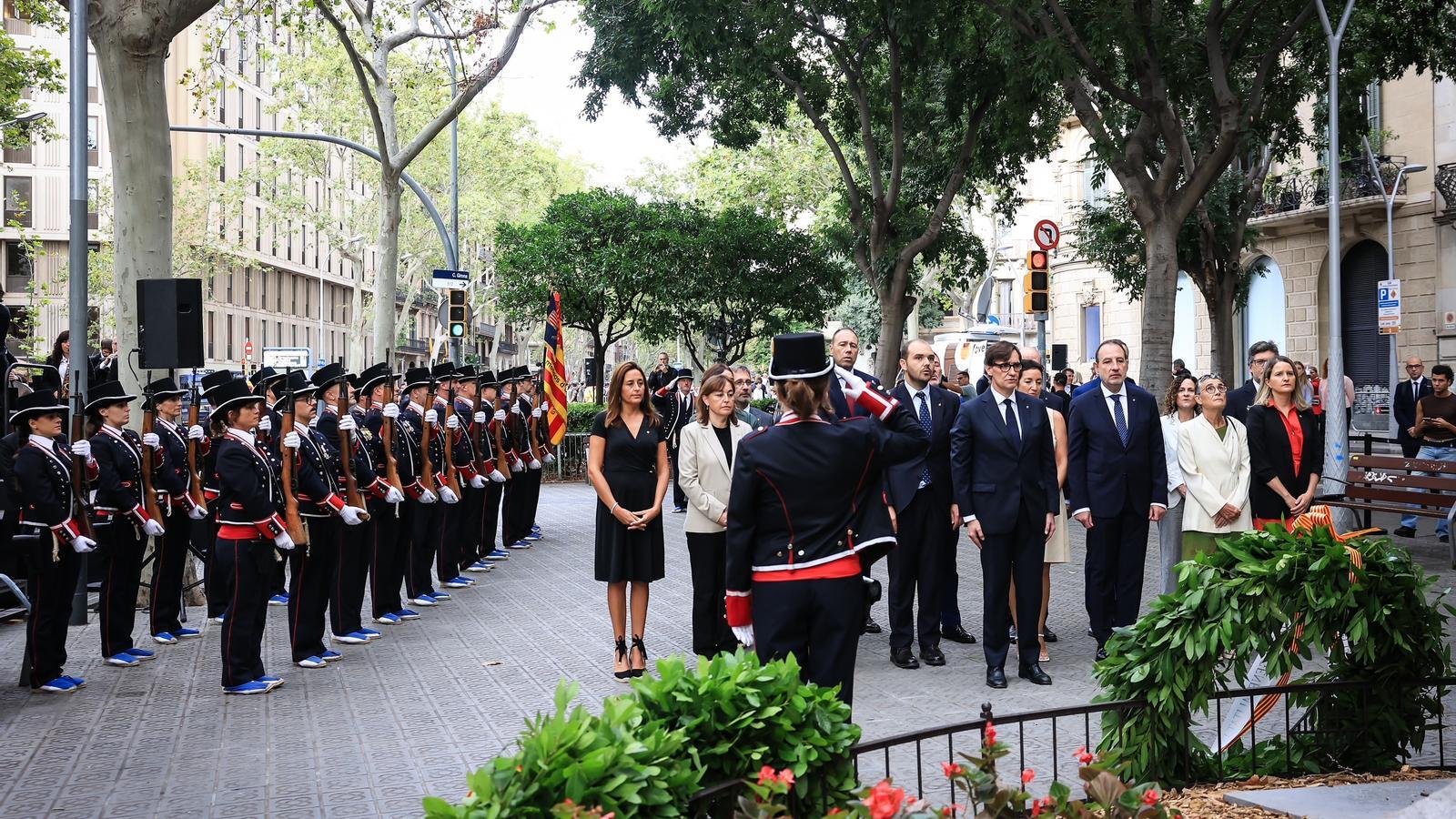The Catalan government is infected with "seny" (common sense), and the Catalan leader is at the heart of the Diada's demands.
Rain kicks the first act of the day, at the Rafael Casanova monument in Barcelona.

BarcelonaOne day after the ruling by the High Court of Justice of Catalonia (TSJC) against the decree protecting Catalan in schools, the defense of the language has focused the messages of political parties and organizations for the Diada on the traditional tribute to the monument of Rafael Casanova. However, the government of Salvador Illa has avoided mentioning the controversial ruling.who has already announced that he will tour—and has chosen to share the "good sense" and "ambition" with which she believes Catalonia should be led. This was conveyed by the Government spokesperson and Regional Minister for Territory, Silvia Paneque, after the offering, which proceeded normally until a downpour forced the media to halt. However, the event continued in the rain (even human towers performed) and allowed the organizations to lay wreaths at the foot of the monument.
If on Wednesday Salvador Illa bet in his institutional speech on "centering Catalonia", this Thursday the spokesperson for the Catalan Government argued that the Diada "should not be an exercise in nostalgia, but rather a starting point" for looking forward. Paneque urged people to keep "the national and civil nerve alive" that has made Catalonia move forward throughout history, claiming it as a land of welcome and "respect." At midday, at an event at the Institut d'Estudis Catalans, the Minister of Language Policy, Francesc Xavier Vila, did refer explicitly to language: he reiterated the Government's commitment to the National Pact And, going a step further, they have conspired to confront the sectors "opposed to the normalization of Catalan and who are trying to dismantle the language." Earlier this morning, Catalonia received congratulations from the Moncloa Palace. Spanish President Pedro Sánchez celebrated Catalonia as "open, plural, and ambitious for the future," but with a spelling mistake: he added an image of the flag with an incorrectly accented word: "dyad".
The Catalan government closed the Diada's institutional agenda with a culturally-focused event at the Teatre Nacional de Catalunya, hosted by journalist Aurora Massip. The event sought to highlight the "plurality" of Catalonia and its diverse social and cultural realities. To this end, it commemorated the figure and legacy of Paco Candel, whose centenary is celebrated this year. Speakers included Antonio Orozco, the Friends of the Arts, Queralt Lahoz, Ignasi Terraza, the Vozes Choir, and the Groove Choir, as well as dancers Núria Guiu and Pere Seda and actor Àngel Llàcer.
Rull denounces the "threats" in the country.
The Speaker of the Catalan Parliament, Josep Rull, did openly address the ruling by the High Court of Justice (TSJC). After the tribute to Casanova's monument, he highlighted two "threats" to the country: the Supreme Court's failure to implement the amnesty law and the decline of the language, which he also denounced to the Secretary General of Junts, Jordi Turull. On this last point, the pro-independence party found an unexpected ally in the Mayor of Barcelona, Jaume Collboni, who lamented the "lack of understanding and sometimes hostility" that Barcelonans suffer for speaking Catalan. Lluïsa Moret, spokesperson for the PSC (Spanish Socialist Workers' Party), also defended the language as a "pillar of the country."
Esquerra took the opportunity to emphasize that for the Republicans, independence and social justice are "one and the same struggle." Its leader, Oriol Junqueras, did so from the Rafael Casanova monument, in his only intervention during the Diada (ERC canceled its political event due to rain, and Elisenda Alamany attended the demonstration afterwards). From Comuns, Gemma Tarafa called for the "extension of rights" to continue and, in passing, criticized Junts for yesterday he voted against the reduction of the working day. The CCOO and UGT also criticized him, warning that they will continue fighting "without stopping" until they reach 37.5 hours a week.
Neither Vox nor Aliança Catalana participated in the offering, nor did the Catalan PP. Its leader, Alejandro Fernández, once again distanced himself from the Diada and chose to appear from the party's headquarters in Barcelona to attack the "normalization" preached by the Government and which, in his opinion, is not happening because important decisions continue to be made "in Belgium," with Carles Puigdemont as the interlocutor. Alberto Núñez Feijóo also congratulated the Catalans on the Diada: he did so in a message to X, first only in Spanish, which he deleted, and which he replaced with a bilingual version, also in Catalan. "For a Catalonia for all, in coexistence and in freedom," he wrote.
The CUP participated in the tribute to Gustau Muñoz, murdered by the Spanish police on September 11, 1978, and emphasized that "the only solution to the social emergency" and the "attack" against Catalan is independence.
